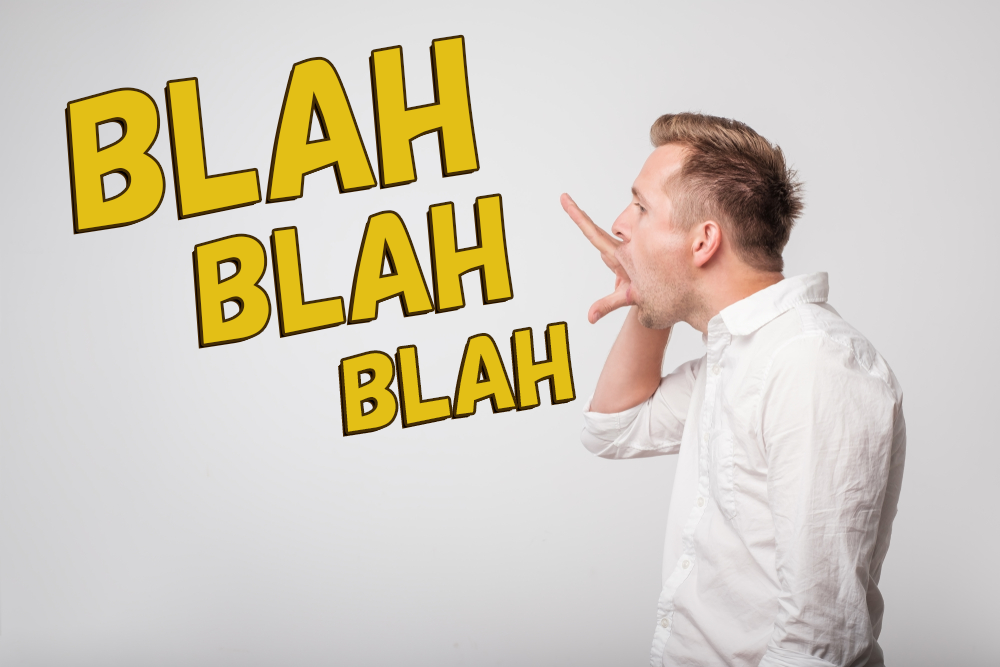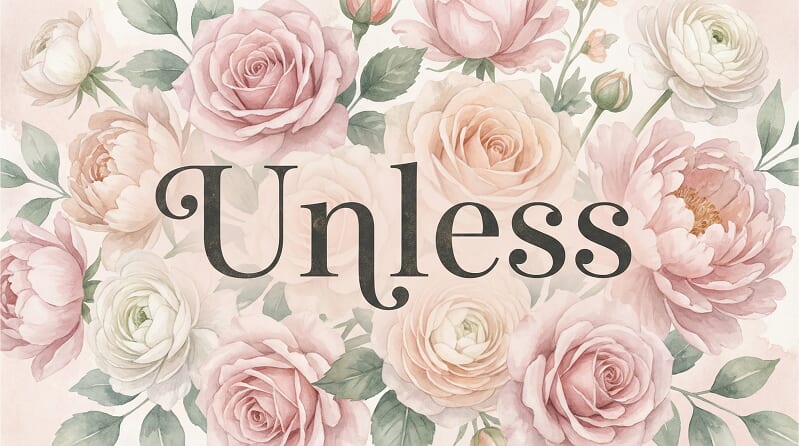英文的外國影集或是電影中,很常看到像「~~~ and blah blah blah.」這樣,台詞後面接「Blah Blah Blah」的情況對吧。
這是像中文的「等等之類的」「還有一些…等等」這樣,延續前面的內容,但省略了之後將要說的話的用法。另外,「Blah」可以單獨使用,而它當名詞和形容詞時的意思不太一樣。
因此這次,我想用「Blah」的例句來解說它的用法。請一定要閱讀到最後喔!
目次
「Blah」是什麼意思?名詞和形容詞的差別
「Blah」是用在俚語上的單字,它的含義在名詞和形容詞上所不同。首先就來看看它們的差別吧。
名詞的「Blah」
名詞的「Blah」是指「荒謬的事情、胡說八道」的意思。和「Nonsense」一樣。
可數名詞的「The blahs」是「疲憊不堪、懶洋洋、不舒服」的意思。
而「Blah Blah Blah」這樣連續的表現,就是像「一些等等之類的」這樣,覺得對自己而言是很無關緊要的話,怎麼樣都可以啦的感覺。
形容詞的「Blah」
形容詞的「Blah」是指「無趣的、乏味的」「憂鬱的、無精打采的」的意思。
He talks on and on every time, he is blah.
他每次都一直講一直講,很無趣。
像這樣,可以表示人或事物很無趣、乏味。
說「Blah!」的場合
單說「Blah!」的時候,是像
A:She said that you discriminate in favor of your classmates.
她說你對你的同學們有差別待遇。
B:Blah!
無聊!
這樣,對於對方說的事情表示「荒謬!」「無聊!」時使用。
說「Blah Blah Blah」的場合
連續說「Blah Blah Blah」的時候是像
The teacher talked about today’s students and neglect of the decline in the student’s scholastic performance and blah blah blah.
老師說了些最近學生的事情和忽視學生的學習表現低落等等的事情。
這樣,把誰說了一些什麼用「什麼什麼的」「這些那些」省略時用的。也可以當成「~等等」,特別是會用在想強調沒有興趣、怎麼樣都可以的時候。
另外,像
A:How was her speech yesterday?
她昨天的演講怎麼樣?
B:She was saying blah blah blah.
她一直滔滔不絕的說著。
這樣,包含著諷刺的語氣「是在說些什麼可是我沒有認真在聽」時也可以使用。當在聽不怎麼有趣的事情、特別是沒什麼內容的事情時會用到的。
再加上,像
Blah blah blah…… Be quiet!
喋喋不休……安靜一點!
這樣,「喋喋不休的」或「滔滔不絕地說」等,表示在說一些什麼的樣子也可以用。
另外,像
A:Please close the refrigerator as soon as possible and ……
請盡量快點把冰箱門關起來。然後……
B:Blah blah blah.
好好好。
這樣,對於對方在說的事情「好好,我知道啦」適當的用附和來回覆也可以用。
用到「Blah」的例句
在這裡,我將介紹幾個用到「Blah」的例句!請大家不要只用看的,一邊想像當時的情境一邊朗讀出來看看吧!
She always gossips about other people, she is blah.
她一直都在講其他人的八卦。她真無聊耶。
A:Your dad was saying that you should behave more elegantly as a woman.
你爸爸總是說你的行為舉止應該要像女性一樣,更優雅才行。
B:Blah! He is really nagging.
無聊耶!他真的很愛碎碎念。
A:Someone was saying that young people today don’t have guts.
有人說最近的年輕人都很沒有膽量。
B:Blah! That’s not only young people.
白痴!不只是年輕人好嗎。
A politician was saying that he will make his campaign pledge happen, make Japan a country better, and blah blah blah.
一位政治家說他將會對現他的承諾,讓日本變成更好國家等等。
A:What was the boss saying in the morning assembly yesterday?
昨天老闆在早上的集會中說了什麼?
B:He was saying that our work attitude is bad, we should report him properly, and blah blah blah
他說我們的態度很糟,應該要好好的向他匯報阿…之類的。
A:How was the president’s press conference?
董事長的記者會怎麼樣?
B:He was saying blah blah blah. He was just saying excuses, so I wasn’t focusing on that.
就一些無關緊要的。只是一些藉口而已,所以我沒有認真在聽。
Blah Blah Blah… Be quiet and focus on your work!
喋喋不休……安靜一點,專注在你的工作上!
A:You don’t always listen to what other people say to you.
你一直都沒在聽別人說的話。
B:Blah Blah Blah.
好好好。
和「Blah」意思相似的表現
Nonsense
「Nonsense」是個名詞,和「Blah」一樣都是「荒謬的事情、沒意義的事情、奇怪的事情」的意思。和中文的「無稽之談」一樣。
He is talking complete nonsense.
他完全是在胡說八道。
可以像上面這樣用,
Nonsense!
無稽之談!
也可以單獨使用。
Don’t talk nonsense. Be more realistic.
不要胡說八道了,現實一點。
A:She is not going to be punished this time.
她這次不會受到懲罰。
B:That’s nonsense! She doesn’t take it seriously at all though.
太沒道理了!雖然她根本不當一回事。
Stupid
「Stupid」和「Blah」一樣都是「愚蠢、無聊」的意思。
「Silly」也有相同的意思,而表示「可笑的」的「Ridiculous」或表示「荒謬」的「Absurd」等用法都一樣。
像「Blah」一樣,可以用來形容事物或人「It’s stupid.」「愚蠢。」,也可以單獨使用「Stupid!」「荒謬!」。
A:Mark has been stalking Melissa every day.
Mark每天都在跟蹤Melissa。
B:Stupid!
太蠢了吧。
A:If you invest in this, you will apparently get a 10 times bigger return.
如果你投資這個,你就會得到十倍以上的回報喔。
B:Stupid! There shouldn’t be such a sweet deal.
笨蛋! 才沒有這麼好的事情咧。
And things like that
「And things like that」也是像「Blah blah blah」一樣,想表示「~等等」「~之類的」時用的。是比同樣用法的「And so on」還要隨意的口語表現。
「And things like that」和「Blah blah blah」不同,「And things like that」是指之前提到的、同種類的事物,而「Blah blah blah」則是像「說了一些什麼什麼的~」,強調對某人所說的話沒有興趣時用的。
You should start packing. Toothbrush, clothes, socks, and things like that.
你應該要開始打包行李了。牙刷、衣服、襪子等等的。
Et cetera
同樣地,想說「~等等」時也可以用「Et cetera」。它在句子中很常用「etc.」這樣省略的形式。
The ingredients for steak hamburg are some beef, bread crumbs, milk, onions, etc.
漢堡排的材料有牛肉、麵包粉、牛奶和洋蔥等等。
總結
這次文章介紹了「Blah」的意思,以及與它相似的表現,各位覺得如何阿?
名詞的「Blah」是指「愚蠢的事情」,而連續的「Blah blah blah」是指「什麼什麼之類的」,表示對他人說的內容不感興趣。
另外,單獨用「Blah!」的情況,是像「胡扯!」,覺得對方說的事物毫無意義、零價值的時候。
另外也有其他不同種的表現,就像這次文章中說明的,請試著用用看不同的表達方式吧!



















